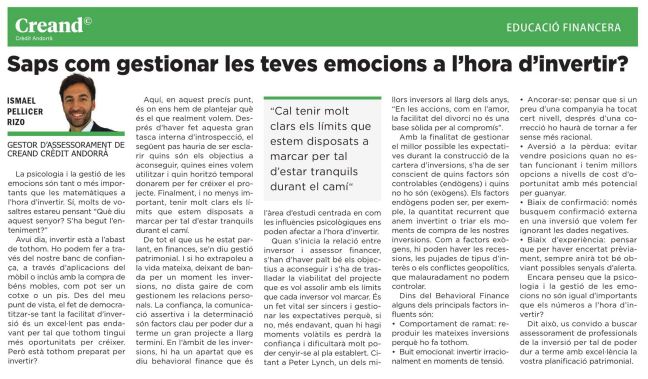Psychology and emotional management are just as important—if not more so—than the numbers when it comes to investing. Yes, many of you might be thinking: what is this guy talking about? Has he lost his mind?
These days, investing is more accessible than ever. We can do it through our trusted bank, via mobile apps or even by purchasing assets like a car or a flat. In my view, this democratisation of investing is a fantastic step forwards, opening up many more opportunities for people to grow. But, is everyone really ready to invest?
This is where we must consider what it is we truly want. After this crucial internal reflection, the next step is to figure out our goals, choose the tools we will use and map out a timeline for growing our project. Lastly, but by no means least, it is essential to set limits we are comfortable with so we can stay calm and confident along the way.
In the context of finance, everything I have been talking about here is known as wealth management. If we take a step back from investments for a moment, it is not so different to how we manage personal relationships in general life. Trust, assertive communication and determination are key factors in any long-term project. In the world of investments, there is a field known as behavioural finance, which focuses on how psychological influences can impact our investment decisions.
When starting a relationship with a financial adviser, it is crucial to have a clear understanding of our goals and to discuss the project’s feasibility within the boundaries we want to set. Being honest and managing expectations from the start is essential. Otherwise, during volatile times, trust can erode, which can make it much more difficult to stick to the established plan. To quote Peter Lynch, one of the best investors over the years, “in stocks as in romance, ease of divorce is not a sound basis for commitment”.
In order to best manage expectations when building an investment portfolio, we need to understand which factors are within our control (endogenous) and which are not (exogenous). Endogenous factors might include the amount we regularly invest or the timing of our investment purchases. Exogenous factors could be recessions, interest rate hikes or geopolitical conflicts, which are sadly out of our control.
In behavioural finance, some of the major influencing factors are:
· Herd behaviour: making the same investments as everyone else because they are popular.
· Emotional gap: making irrational investments during times of stress.
· Anchoring: believing that if a company’s price has reached a certain level, it will inevitably return to that level after a correction, without any rational basis.
· Loss aversion: avoiding selling positions that are not performing well when there are better options available with higher potential returns, based on the opportunity cost.
· Confirmation bias: only seeking external confirmation of an investment we want to make while ignoring negative data.
· Experiential bias: thinking that because you have been right before, everything will always turn out well, while ignoring potential warning signs.
Do you still think psychology and emotional management are not as important as the numbers when it comes to investing?
With this in mind, I encourage you to reach out to investment professionals who can advise and guide you through your wealth planning with expertise.

Article publicat al Diari d’Andorra 14.08.2024